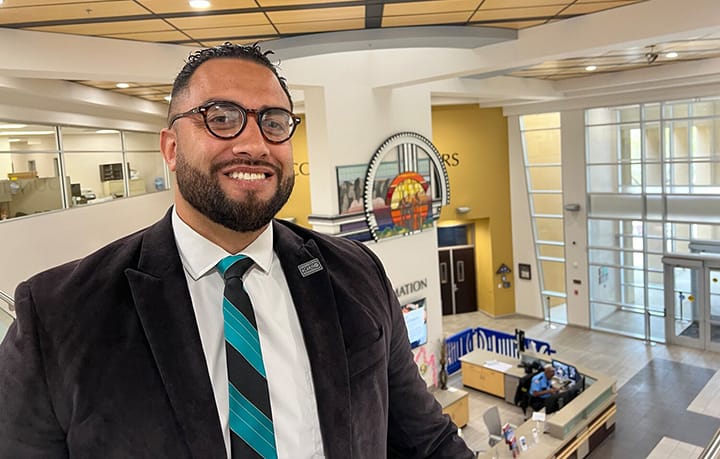AG office: City violated law in selection of city manager
State investigation reveals Las Cruces violated Open Meetings Act in closed-door selection of new city manager and employment agreement approval

Algernon D’Ammassa, Las Cruces Bulletin
LAS CRUCES - The city of Las Cruces violated New Mexico’s Open Meetings Act throughout the process of selecting its new city manager earlier in 2024, an investigation by the state Department of Justice found.
In fact, based on public records and official meetings, the state found that city manager Ikani Taumoepeau was never formally appointed, though the council approved an employment agreement with him including an annual $216,000 salary.
As a result, “the City Council engaged in closed deliberations and invalid (final) actions prior to the single, open public meeting held to discuss the hiring of a new city manager on April 1, 2024. These actions deprived the public of any meaningful opportunity to participate in, or even witness the deliberations on, a question of significant public importance.”
That conclusion was stated in a determination letter following a months-long investigation by the Government Counsel and Accountability Division, under the New Mexico Attorney General. The letter also indicated that, during the investigation, city staff had acknowledged errors and taken corrective actions. The Department of Justice is authorized to enforce the law through district court, and even to pursue misdemeanor charges, although that is rare.

The office reviewed information gathered by Bulletin news staff, videos and agendas of city council meetings, press releases, text messages, resolutions approved by councilors and reports published by the Bulletin.
City Manager Ifo Pili resigned from the city in February after three and a half years for a new job in Utah. The process of choosing his successor moved quickly and mostly out of public view, and ended with the selection of Ikani Taumeopeau, an assistant city manager who had begun his career working under Pili in Utah before serving as city manager of Clayton, Calif. from 2019 to 2020. He reunited with Pili and took a position with the city of Las Cruces in 2021.
When Pili’s resignation was announced on Feb. 28, the city stated that internal applications for the job were underway, an indication that a decision had been made to hire Pili’s replacement internally rather than launch an executive search.
At the time, city spokesperson Mandy Guss told the Bulletin,“The city manager hiring process was suggested by Ifo, who spoke individually with the city council members and got their OK to move forward.”
Investigator Blaine Moffat wrote in the Dec. 20 determination letter that the city council, Mayor Eric Enriquez and Pili had reached “a private consensus to accept internal applications” through what is commonly called a rolling quorum.
The law states that any meeting of a quorum, meaning the minimum number of members of a municipal government required for a legal business meeting, must comply with the requirements of official meetings of public governing bodies, including advance notice and publications of an agenda.
The law allows public bodies to meet in closed session for certain topics, such as certain personnel matters or confidential discussions with legal counsel.
The city had argued that no policy vote took place, and that no violation of the law had therefore occurred. However, as the city manager is the one position appointed by the city council, Moffat determined that the selection process needed to be discussed in open session, “regardless of any formal votes occurring.”
Besides the scope of the search, Moffat wrote that the March 18 selection of three finalists for the job in a closed meeting also violated the Open Meetings Act. While the law permits discussions of hiring, firing, promotions and similar matters out of public view, Moffat emphasized that that pertains to discussions of individual public employees. The selection of finalists “must have occurred in an open meeting, as these are matters of public business and affect the public,” Moffat wrote.

Similarly, the office determined that the selection of Taumoepeau in a closed session on March 20 was also illegal. Text messages between councilors and Taumoepeau indicated the selection and offer were made in closed session, as well as a press release from the city on March 21 announcing the council had made an offer. The mayor stated in that press release, “…the decision was not easy.”
By the April 1 meeting where councilors approved Taumoepeau’s contract, Moffat wrote, “it was clear that the employment agreement … had already been negotiated, as the contract was already drafted and ready for the City Council’s approval. The City Council never publicly discussed the selection of Mr. Taumoepeau, only the employment agreement.”
“The City Council’s lack of compliance (with open meetings law) deprived the public of information and the opportunity to participate in the affairs of government and the official acts of public officers and employees who represent them,” Moffat wrote.
It also rendered the process legally invalid, starting with the decision to limit the scope to internal candidates, the letter stated.
The GCA investigation also found that required public statements about what was discussed in closed session had not been made promptly, as the law directs, while noting the council had said that arose from an error “due to misrepresentation of the requirement by staff.”
The GCA offered the city two ways to cure the violations.
One option is to hold a properly noticed open meeting “summarizing all the discussions and comments made outside of a public meeting in violation of OMA, and ratifying the actions by a public and open vote of a majority of the City Council.” The discussion would need to address all of the defects in the process dating back to the decision to limit the search to internal candidates. This would not have the effect of validating the decisions retroactively, Moffat underscored, and the approvals would take effect on the day of the new meeting. The implications of that on matters including the employment agreement were not immediately clear.
Another option offered to the city was starting the entire process over and conducting all deliberations and votes in lawful public meetings.
In a written response, City Attorney Brad Douglas did not indicate which option the city would choose.
“We will take immediate action to remedy the deficiencies the (Attorney General) identified. We will take this as a learning opportunity and make improvements in the future. As the AG acknowledged, we have already made corrective action regarding the closed meeting statement requirements.”
Algernon D'Ammassa is Managing Editor of the Las Cruces Bulletin. This article was provided through the AP Storyshare program.



